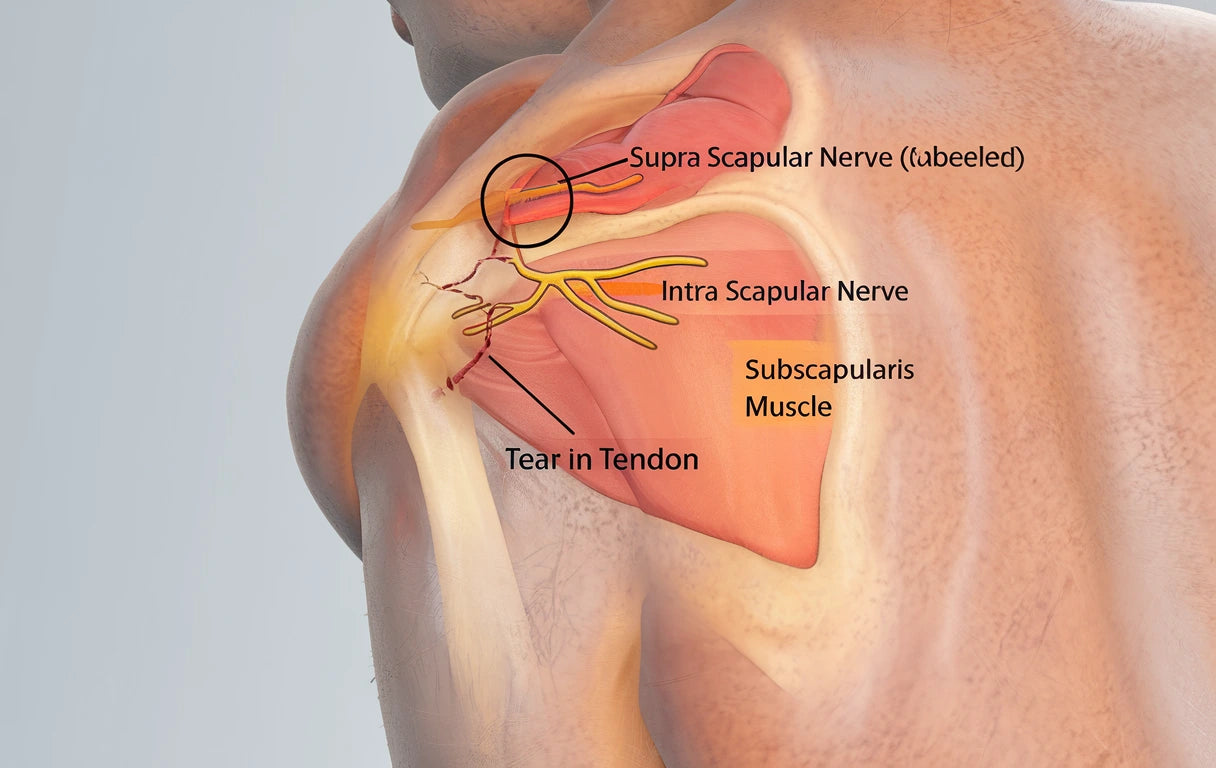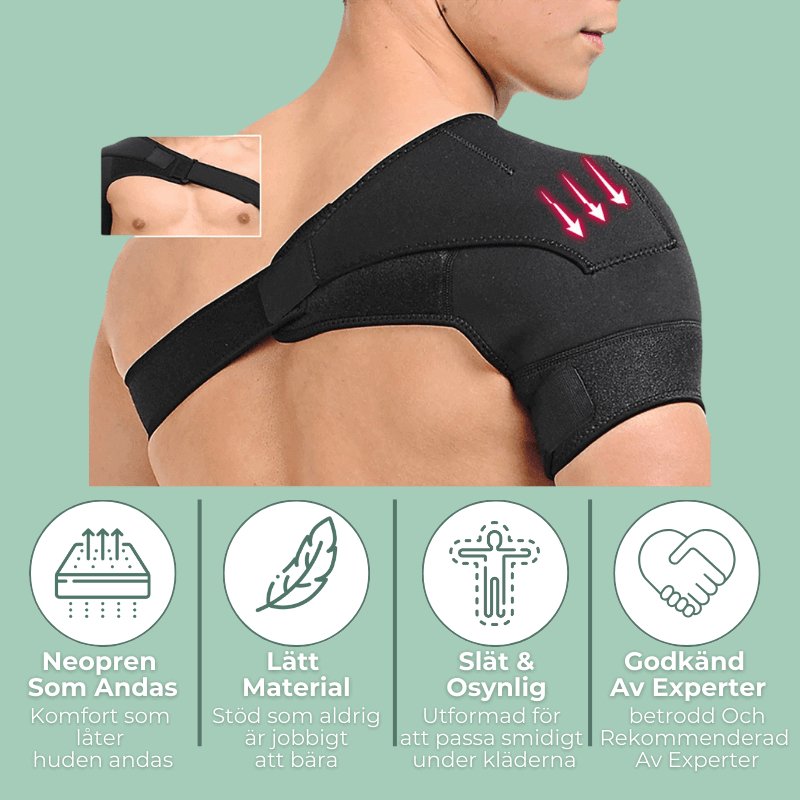Nerve Compression in the Shoulder: Symptoms, Causes, and Treatment

Nerve compression in the shoulder, also known as shoulder entrapment, is a condition where a nerve in the shoulder area gets pinched or subjected to pressure. This can lead to a range of different symptoms that affect shoulder function and cause discomfort. In this article, we will go through the most common symptoms, causes, and treatment options for nerve compression in the shoulder.
Definition and Understanding: Nerve Compression and Impingement in the Shoulder
Nerve compression in the shoulder occurs when a nerve is pinched, resulting in radiating pain, numbness, and tingling in the arm. Common causes include muscle tension and injuries. Early diagnosis and treatment with rest, physical therapy, and medication are crucial for alleviating discomfort.
Symptoms and Signs: Common Symptoms of Nerve Compression and Shoulder Pain
Nerve compression in the shoulder can manifest in several ways, and the symptoms may vary in intensity and duration. Common symptoms include:
- Pain and tenderness in the shoulder: This is often the most prominent symptom. The pain can be sharp, burning, or aching and may worsen with certain movements or positions.
- Tingling and numbness in the arm: Many experience a tingling or numb sensation that can extend from the shoulder down to the hand.
- Muscle weakness in the arm: Nerve compression can lead to weakness in the arm, making it difficult to perform everyday activities.
- Reduced mobility in the shoulder joint: You may experience limited mobility in your shoulder, especially when trying to lift your arm overhead.
- Radiating pain: The pain may radiate from the shoulder down into the upper arm, sometimes as far as the wrist.
- Increased pain at night: Many find that symptoms worsen at night or when resting their arm.
Shoulder pain that begins when lifting the arm sideways or forward is a typical sign of impingement in the shoulder, where tissues are compressed between the upper arm bone and scapula. Pain that worsens with specific movements, particularly when involving the supraspinatus tendon, may indicate that structures within the shoulder are affected.
Causes and Risk Factors: What Causes Inflammation Affecting The Rotator Cuff?
Several factors can contribute to developing nerve compression in the shoulder:
- Wear and tear of the shoulder joint: With age, wear on this joint can reduce space through which nerves pass.
- Rotator cuff injuries: Damage to muscles and tendons stabilizing this area increases risk for nerve compression.
- Bursitis of Shoulder Bursae: Swelling within bursae can exert pressure on nearby nerves.
- Poor posture: Long-term poor posture may compress nerves around neck and shoulders.
- Overuse: Repetitive motions or overloading of shoulders can cause swelling/inflammation pressing on nerves.
Impingement syndrome often arises due to overload or trauma to shoulders. Tissue swelling around tendons/muscles might cause these structures to become pinched when lifting arms. Issues within thoracic spine could also contribute toward improper biomechanics affecting shoulders increasing risk for tissue damage/nerves being compressed.
Diagnosis and Treatment: Examination, Rehabilitation, and Self-Care for Nerve Compression
To effectively treat nerve compression in the shoulder, it is important to obtain a correct diagnosis and choose the right treatment method:
| Behandlingsmetod | Beskrivning | Fördelar med AxelKomforten™ |
|---|---|---|
| Fysioterapi | Övningar för att stärka och öka rörligheten | Stödjer under övningar och främjar korrekt hållning |
| Smärtlindring | Antiinflammatoriska läkemedel | Kan minska behovet av medicin genom naturlig avlastning |
| Ultraljudsguidad behandling | Hydrodissektion eller kortisoninjektion | Kompletterar medicinsk behandling |
| Hållningskorrigering | Förbättrar axelns position i vardagen | AxelKomforten™ stödjer korrekt hållning |

Support and Pain Relief: How AxelKomforten™ Stabilizes the Shoulder and Improves Mobility
AxelKomforten™ offers several benefits for individuals suffering from nerve compression in the shoulder:
- Provides support and relief to the affected shoulder, which can reduce pressure on the nerves.
- Helps improve posture and reduces the risk of further nerve compression.
- Can be used during daily activities to provide continuous support and reduce strain on the shoulder.
- Supports rehabilitation exercises and may contribute to faster recovery.
- Potentially decreases the need for pain-relieving medications by providing natural relief.
For individuals with shoulder impingement, AxelKomforten™ can be particularly beneficial by supporting the scapula in the correct position, helping to create more space for the upper arm bone to move without pinching damaged tissues. This can reduce pain and improve functionality during the healing process.
Buy nowSummary: Key Points About Nerve Compression and Rehabilitation in the Shoulder
Nerve compression in the shoulder can be a painful and limiting condition, but with the right diagnosis and treatment, most individuals can experience significant improvements. By combining medical treatments, physical therapy, and the use of supportive aids like AxelKomforten™, many can effectively manage their symptoms and regain normal shoulder function. It is important to seek professional help early to prevent the condition from worsening and to initiate an effective treatment plan.
For best results, one should avoid activities that exacerbate symptoms and closely follow the treatment plan. With proper care and patience, most patients with nerve compression in the shoulder can see a significant improvement in both pain and function over time.
Frequently Asked Questions (FAQ)
How long does a pinched nerve in the shoulder usually last?
The duration may vary, but with the right treatment, many can experience improvement within a few weeks to months. Some cases may require a longer treatment time.
Can I exercise with a pinched nerve in my shoulder?
Light exercise and specific movements are often recommended as part of the treatment. Consult a physiotherapist for a tailored program that does not exacerbate the condition.
How do I use AxelKomforten™ for nerve compression in the shoulder?
Use AxelKomforten™ as instructed, typically during daily activities to provide support and improve posture. It can be particularly helpful during periods of increased activity or strain on the shoulder.
Can nerve compression in the shoulder lead to permanent damage?
If the condition is treated in time, the risk of permanent damage is low. However, prolonged untreated nerve compression can potentially lead to more lasting issues.
When should I seek medical care for suspected nerve compression in the shoulder?
Seek medical attention if you experience persistent pain, numbness, or weakness in the shoulder or arm, especially if the symptoms do not improve with rest and self-care after a few days.
